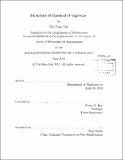Structure of classical W-algebras
Author(s)
Suh, Uhi Rinn
DownloadFull printable version (4.795Mb)
Other Contributors
Massachusetts Institute of Technology. Department of Mathematics.
Advisor
Victor G. Kac.
Terms of use
Metadata
Show full item recordAbstract
The first part of the thesis provides three equivalent definitions of a classical finite W-algebra Wfin(g, f) and two equivalent definitions of a classical affine W-algebra W(g, f, k) associated to a Lie algebra g, a nilpotent element f and k [epsilon] C. A classical affine W-algebra W(g, f, k) has a Hamiltonian operator H and the H-twisted Zhu algebra of W(g, f, k) is the classical finite W-algebra Wfin (9, f). A classical finite (resp. affine) W-algebra is isomorphic to a polynomial (resp. differential polynomial) ring. I compute Poisson brackets (resp. Poisson [lambda]-brackets) between generating elements of a classical finite (resp. affine) W-algebra when f is a minimal nilpotent. In the second part, I introduce a classical finite (resp. affine) fractional W-algebra Wfin(g, Am, k) (resp. Wfin(g, Am,k)), where Am = -fz- m - pz-m-1 [epsilon] g((z)) for a certain p [epsilon] g and an integer m >/= 0. If m = 0, then the algebra Wfin(g, Am, k) (resp. W(g, Am, k)) is isomorphic to Wfin(g, f) (resp. W(g, f, k)). I show that an affine fractional W-algebra W(g, Am, k) has a Hamiltonian operator H and the H-twisted Zhu-algebra of W(g, Am, k) is Wfin(g, Am, k). As in ordinary W-algebras cases, a classical finite (resp. affine) fractional W-algebra is isomorphic to a polynomial (resp. differential polynomial) ring. In particular, I show explicit forms of generators and compute brackets (resp.[lambda]-brackets) between them when f is a minimal nilpotent. Using generalized Drinfel'd and Sokolov reduction, I find an infinite sequence of integrable systems related to an affine fractional W-algebra when Am is a semisimple element in g((z)). In the last part, I introduce generalized Drinfeld-Sokolov reductions and Hamiltonian ODEs associated to classical finite W-algebras and finite fractional W-algebras. Also, I find integrals of motion of the Hamiltonian ODEs using Drinfel'd-Sokolov reductions. It is an open problem whether these equations are Lenard integrable.
Description
Thesis (Ph. D.)--Massachusetts Institute of Technology, Department of Mathematics, 2013. Cataloged from PDF version of thesis. Includes bibliographical references (pages 171-172).
Date issued
2013Department
Massachusetts Institute of Technology. Department of MathematicsPublisher
Massachusetts Institute of Technology
Keywords
Mathematics.